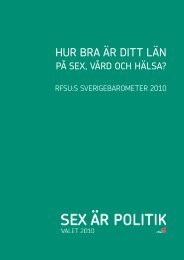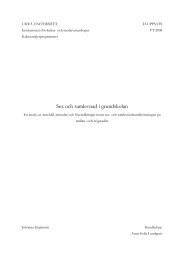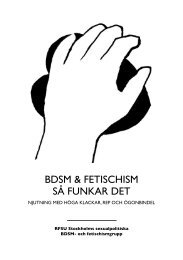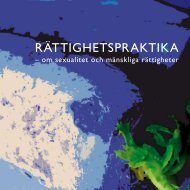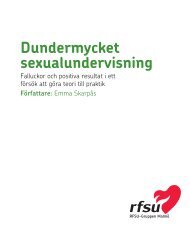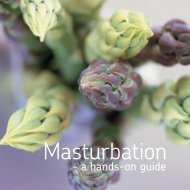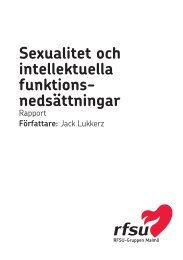Download pdf - RFSU
Download pdf - RFSU
Download pdf - RFSU
You also want an ePaper? Increase the reach of your titles
YUMPU automatically turns print PDFs into web optimized ePapers that Google loves.
Purchasing the services of a prostitute thus becomes an<br />
attempt to cope with an inner conflict where a strong need<br />
for a partner is in conflict with the fear of dependency.<br />
For the men who are living with women buying sex or<br />
consuming pornography becomes a secret, which creates<br />
a distance between them. By secretly going to prostitutes<br />
an illusion of freedom, independence and autonomy is<br />
preserved. When intimacy with a partner becomes too<br />
intense and claustrophobic it can “be diluted” with help<br />
from a prostitute, and the relationship is saved.<br />
For the majority of the women we have come in contact<br />
with the balance between dependency and independence<br />
tends to take a different form. Unlike the men, the<br />
women who were living with a partner tended not have<br />
the division between a “normal life” and a “secret life”.<br />
Instead most of these women described relationships with<br />
clear destructive or self-destructive elements and a strong<br />
dependency on a man they know was “bad” for them.<br />
These women also described how prostitution has<br />
come between their partner and themselves, both as a<br />
means of protection and as a hinder. The women living<br />
without a partner, seemed to avoid close relationships on<br />
the whole. In these cases the polarity between dependency<br />
and independence more of an “either or” issue, either<br />
strong and destructive behaviour or loneliness and an<br />
avoidance of closeness.<br />
A characterisation of this theme might look a little like<br />
this:<br />
• If I get closer to you, and you really understand<br />
and help me, I will become dependent on you.<br />
Then if you leave me, I’ll fall apart. You will take<br />
everything with you and leave me destitute and<br />
abandoned.<br />
• If I get closer to you, you’ll demand more and<br />
more, and I’ll become tied to you to keep you<br />
happy. If I don’t give you what you want, you’ll<br />
take revenge or lose interest in me.<br />
• If I come to need you – you’ll mock me and<br />
humiliate me because I’m weak.<br />
• Better then to continue as before. I can manage<br />
on my own. If there’s no one or nothing I need,<br />
then nothing catastrophic can happen.<br />
Shame – shamelessness – contempt<br />
Shame is about who you are. It is a feeling that characterises<br />
the whole person; one is ashamed of one self.<br />
The deepest shame is the feeling of not being worthy<br />
of love. The opposite of shame is contempt. The person<br />
being held in contempt feels ashamed. Shame over oneself<br />
can be transformed into contempt of someone else.<br />
Shamelessness is also related to shame. By being shameless<br />
a person can try and deny and hide shame.<br />
Both the men and women express self-contempt.<br />
Despite shameful secrets (i.e. buying sex and consuming<br />
pornography) the men described what they relate to as personal<br />
faults and short-comings. They feel that they should<br />
be different, more active, braver, more manly. Added to<br />
this is the fact that they are feeling deviant, perverse and<br />
powerless in relation to their behaviour, which they experience<br />
as obsessive. Many described a fear of an inner<br />
catastrophy if they kept from buying sex or consuming<br />
pornography. This self-contempt appears linked to the<br />
awareness of one’s fears, feelings of inferiority and how<br />
much one needs others.<br />
To the psychotherapists this has appeared as chronic<br />
shame, not connected to feeling loved and appreciated for<br />
17



